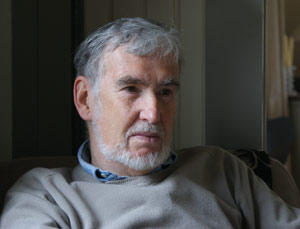“It is a very bleak film, about a man facing the fact that there is no God, and John didn’t believe in God. He had a very personal connection with the film and on a November day in Edinburgh, I imagine it might feel quite appropriate,” said filmmaker and writer Mark Cousins, who became friendly with Orr when they collaborated over the Edinburgh Film Festival in the early 1990s.
“I thought I needed to beef up the intellectual content of the festival so I got in touch with John and we became collaborators. He knew so much but he never talked down to anybody.”
“I work in film production and most people aren’t that knowledgeable. That was one reason why I appreciated John. He was a great man to sit at the table with. It was like having the history of world cinema sitting opposite you. We shared a flat in Cannes each year and we would come back at night, have another glass of wine and look across the sea and talk about the day’s films.”
Orr’s passion for cinema was what really stood out, both in his writings and in his talk. His colleague Martine Beugnet remembers frequent arguments over the work of French film maker Philippe Grandrieux, whose early films Orr claimed were morbidly self-indulgent. “But then we went to see his most recent film, Un Lac, and after all these years, John loved it. He wasn’t afraid to change his mind.”
Orr had no time for the clichéd view of British cinema being all about gritty realism. He took British cinema seriously as art and saw the work of filmmakers such as Terence Davies, Ken Russell and Derek Jarman as being essentially romantic.
He was also a fan of the Scots filmmaker Bill Douglas and excited by the work of new Scots filmmakers such as Lynne Ramsay (who made the acclaimed Ratcatcher and Morvern Callar) and Andrea Arnold (Red Road and Fish Tank).
Born to Protestant parents from Belfast but raised in England, Orr was educated at Watford Grammar School, where he was strongly influenced by Harry Ree, the Jewish wartime Resistance hero.

 Born: 26 July, 1943, in Gillingham, Kent.
Born: 26 July, 1943, in Gillingham, Kent.